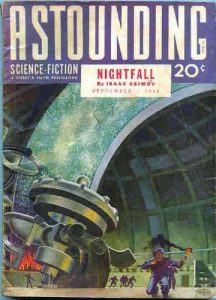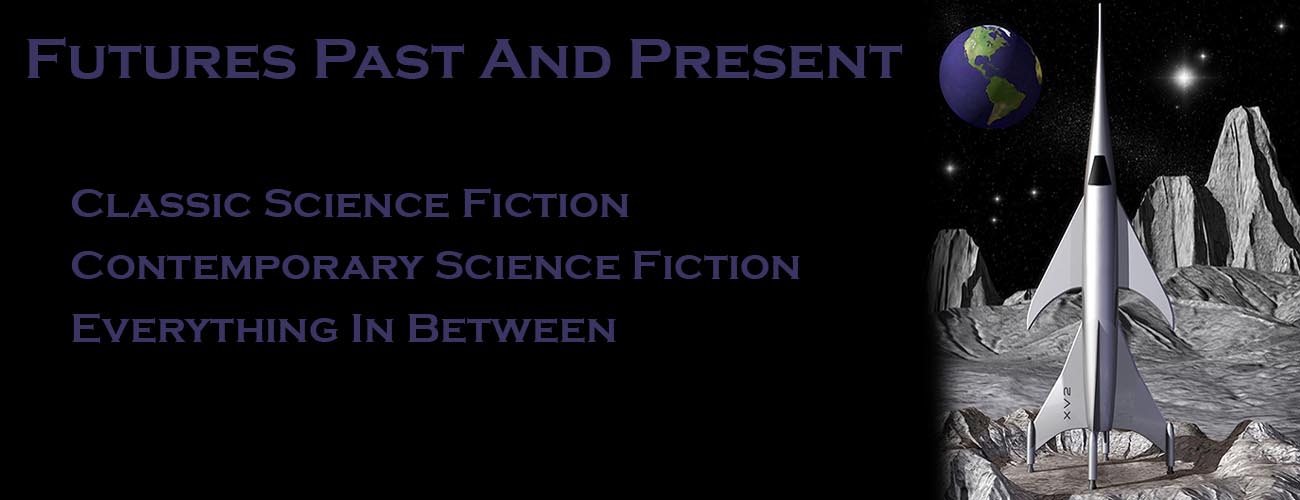 Today, January 2, marks the centennial of the birth of Isaac Asimov (1920-1992). I’m going to try to read/reread some of his major works this year. I read a lot of Asimov in middle school and high school, but I not much after I got my undergraduate degree.
Today, January 2, marks the centennial of the birth of Isaac Asimov (1920-1992). I’m going to try to read/reread some of his major works this year. I read a lot of Asimov in middle school and high school, but I not much after I got my undergraduate degree.
Like him or hate him, there is no denying that Isaac Asimov was one of the most influential science fiction authors of the 20th Century.
I also am reading through The Astounding Science Fiction Anthology right now. (See this post.) In addition to this being a birthday post, it will also be Part 2 of that read-through.
I said I would mostly read the stories in the anthology in order, but I’m making an exception. I reviewed the first two stories two days ago. I’m skipping the next two and jumping to the fifth, Asimov’s “Nightfall” because it’s his birthday. It was first published in the September 1941 issue of Astounding. It is one of Asimov’s best stories and has been reprinted multiple times. Just stay away from that movie from the 80’s starring David Birney. It’s horrible.
I first read “Nightfall” in Asimov’s collection of the same name when I was in 8th grade and then a few years later in the the 1941 volume of Isaac Asimov Presents the Great Science Fiction Stories. I don’t recall how long it’s been since the last time I read it, but it has been a while. Most of the details had faded.
 I was pleased to find the story held up well. In fact, I think it has aged better than many of the stories published in any of the pulps in the early 1940s. The setting is a planet in a distant cluster of stars. It’s is populated by humans and has been for thousands of years. Asimov never addresses the question, but a reference to Earth on the last page implies that the planet may have been settled by Earthmen. If that is the case, that knowledge has been lost.
I was pleased to find the story held up well. In fact, I think it has aged better than many of the stories published in any of the pulps in the early 1940s. The setting is a planet in a distant cluster of stars. It’s is populated by humans and has been for thousands of years. Asimov never addresses the question, but a reference to Earth on the last page implies that the planet may have been settled by Earthmen. If that is the case, that knowledge has been lost.
The planet is in a multiple star system, so it is never dark there. People are literally afraid of the dark because it is never dark unless they are in a cave. Once every two thousand forty-nine years all but one of the suns is on the opposite side of the planet. (It is implied but not stated that only one continent is populated.) That is when a planet passes in front of the remaining sun. Because the planet’s disk is of much greater diameter than the sun’s disk, the eclipse lasts for hours rather than minutes.
Being terrified of the darkness and not understanding its cause, people produce light the only way they can. They burn things. Like their entire civilization.
A group of astronomers are waiting for the eclipse, along with a reporter. There are also cultists who are welcoming the coming collapse of civilization.
Asimov does an excellent job of extrapolating what this world would look like, including how physics would have developed on such a world. I found his set up fascinating and intriguing. Asimov has a reputation in some circles of being a dull writer. That isn’t the case here. Much of the story consists of conversations between the scientists and the reporter. There is some action, not a lot, of course, but enough to break up the dialogue. Asimov did a great job of creating a sense of impending doom.
“Nightfall” is rightfully considered a classic. In spite of its age, it’s worth reading. If you haven’t, find a copy. It’s been reprinted numerous times.

I remember reading “Nightfall.” I don’t remember the details but the mood of the piece still sticks with me.
I recall not being excited that he (co-wrote, if I remember) the story into a novel. I thought the short story had done everything it needed to. Then again, I feel like he dragged Foundation out a bit too much at the end, too.
I’ve not read the novel, either. And I agree about Foundation, especially when the new novels came out with the different coauthors. I have no interest in reading them.
I’m not sure when I first encountered “Nightfall”, maybe in one of the Year’s Best SF anthologies, but the story really impressed me. It still does, honestly.
I remember reading the novelization and not liking it nearly as much– its only real strength is that it did deal with the post-eclipse world.
While I agree that the ’80s movie with David Birney is not a good movie, I have a soft spot in my heart for it for some reason. Like, I can imagine some Hollywood executive, cocaine dust coating his nose, putting “Nightfall” down and saying “If we can replace the scientist with a Robert Plant-esque philosopher king, who will remain shirtless for the entire movie, I’ll green light it!”
Last bit, the old radio show X Minus One did a great version of Nightfall: https://www.youtube.com/watch?v=KKwm0ux0ATg
Thanks for the link, Adrian. I am not sure if I knew about the X Minus One broadcast. They adapted a lot of classic stories, and were pretty faithful to the source material when they did. There was another radio program, Dimension X that preceded it. Here’s a list of the the episodes by famous sf writers. https://en.wikipedia.org/wiki/X_Minus_One#Episodes_based_on_stories_by_famous_writers
I haven’t read the novel. Your take on a Hollywood executive is hilarious.
Thanks!
I think I have listened to all the X-Minus One episodes and the Dimension X episodes, many of them are quite good!
-Adrian Simmons
Pingback: Solar Eclipse 2024 | Adventures Fantastic